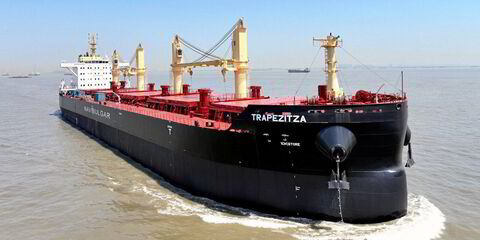The International Chamber of Shipping (ICS) has submitted a proposal to the International Maritime Organization for a levy on carbon emissions to fund the adoption of zero-carbon technologies and fuel.
The levy would be applied globally to all ships over 5,000 gt.
The ICS did not indicate at this stage how much shipowners would be expected to pay.
The money raised would be put in a climate fund run by the IMO to establish bunkering infrastructure for alternative fuels, including ammonia and hydrogen.
It would also fund a subsidy to close the price gap between low-carbon alternative fuels and conventional heavy fuel oil (HFO).
The move is a response to the European Union’s decision to include shipping in its regional emissions trading system (ETS).
“What shipping needs is a truly global market-based measure like this that will reduce the price gap between zero-carbon fuels and conventional fuels,” said ICS secretary general Guy Platten.
“The rapid development of such a mechanism is now a vital necessity if governments are to match actions with rhetoric and demonstrate continued leadership for the decarbonisation of shipping.”
'More stable than ETS'
The carbon fund would be in addition to a separate industry proposal for a $5bn technology fund from a $2-per-tonne levy on HFO sales.
“We need to be able to put zero-emission ships in the water by 2030 without challenging price and safety issues. If the IMO lends its backing to our proposal, then we may yet be able to change this and deploy technologies economically and equitably,” Platten said.
The levy proposal, which is also being backed by dry bulk association Intercargo, would be a more stable alternative to the EU’s proposed ETS, he said.
The EU scheme is “more about generating revenue for governments from non-EU shipping than helping shipping to decarbonise”.
“A levy-based system can give the industry price certainty and more stability for making investment decisions in zero-carbon ships and developing emissions-saving technology,” he added.
The Marshall Islands, Kiribati and the Solomon Islands have submitted a separate proposal for a $100-per-tonne levy on carbon emissions.






